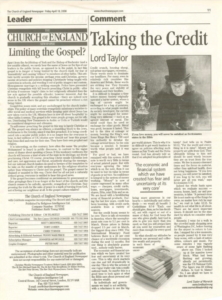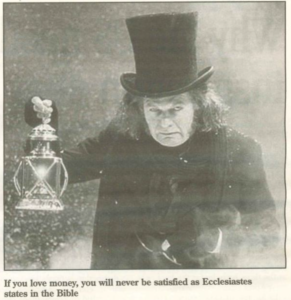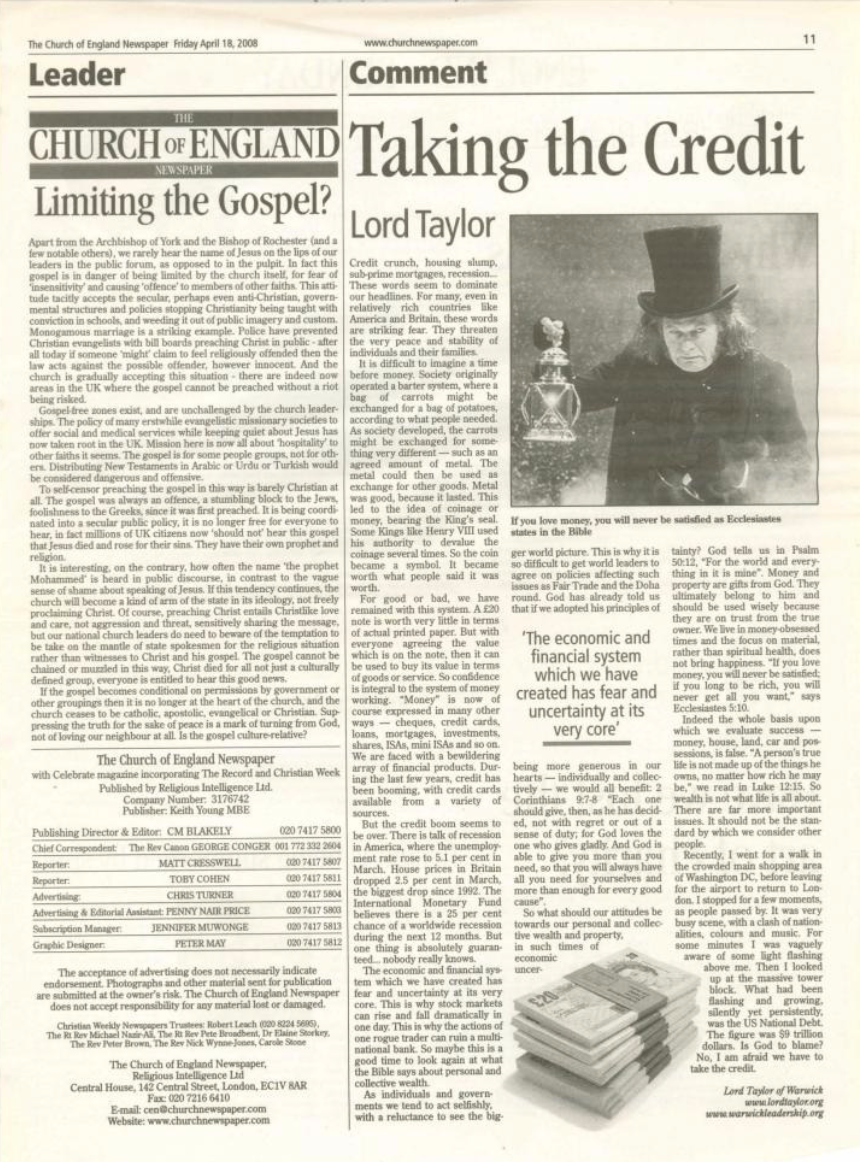Church of England Article By Lord Taylor of Warwick
 Credit crunch, housing slump, sub-prime mortgages, recession… These words seem to dominate our headlines. For many, even in relatively rich countries like America and Britain, these words are striking fear. They threaten the very peace and stability of individuals and their families.
Credit crunch, housing slump, sub-prime mortgages, recession… These words seem to dominate our headlines. For many, even in relatively rich countries like America and Britain, these words are striking fear. They threaten the very peace and stability of individuals and their families.
It is difficult to imagine a time before money. Society originally operated a barter system, where a bag of carrots might be exchanged for a bag of potatoes, according to what people needed. As society developed, the carrots might be exchanged for something very different — such as an agreed amount of metal. The metal could then be used as exchange for other goods. Metal was good, because it lasted. This led to the idea of coinage or money, bearing the King’s seal. Some Kings like Henry VIII used his authority to devalue the coinage several times. So the coin became a symbol. It became worth what people said it was worth.
For good or bad, we have remained with this system. A £20 note is worth very little in terms of actual printed paper. But with everyone agreeing the value which is on the note, then it can be used to buy its value in terms of goods or service. So confidence is integral to the system of money working. ‘Money” is now of course expressed in many other ways – cheques, credit cards, loans, mortgages, investments, shares, ISAs, mini ISAs and so on. We are faced with a bewildering array of financial products. During the last few years, credit has been booming, with credit cards available from a variety of sources.
But the credit boom seems to be over. There is talk of recession in America, where the unemployment rate rose to 5.1 per cent in March. House prices in Britain dropped 2.5 per cent in March, the biggest drop since 1992. The International Monetary Fund believes there is a 25 per cent chance of a worldwide recession during the next 12 months. But one thing is absolutely guaranteed… nobody really knows.
The economic and financial system which we have created has fear and uncertainty at its very core. This is why stock markets can rise and fall dramatically in one day. This is why the actions of one rogue trader can ruin a multi-national bank. So maybe this is a good time to look again at what the Bible says about personal and collective wealth.
As individuals and governments we tend to act selfishly, with a reluctance to see the bigger world picture. This is why it is so difficult to get world leaders to agree on policies affecting such issues as Fair Trade and the Doha round. God has already told us that if we adopted his principles of being more generous in our hearts – individually and collectively – we would all benefit: 2 Corinthians 9:7-8 “Each one should give, then, as he has decided, not with regret or out of a sense of duty, for God loves the one who gives gladly. And God is able to give you more than you need, so that you will always have all you need for yourselves and more than enough for every good cause”.
So what should our attitudes be towards our personal and collective wealth and property, in such times of economic uncertainty? God tells us in Psalm 50:12, “For the world and every~ thing in it is mine”. Money and property are gifts from God. They ultimately belong to him and should be used wisely because they are on trust from the true owner. We live in money-obsessed times and the focus on material, rather than spiritual health, does not bring happiness. “If you love money, you will never be satisfied, if you long to be rich, you will never get all you want,” says Ecclesiastes 5:10.
Indeed, the whole basis upon which we evaluate success – money, house, land, car and possessions, is false. “A person’s true life is not made up of the things he owns, no matter how rich he may be,” we read in Luke 12:15. So wealth is not what life is all about. There are far more important issues. It should not be the standard by which we consider other people.
 Recently, I went for a walk in the crowded main shopping area of Washington DC, before leaving for the airport to return to London. I stopped for a few moments, as people passed by. It was very busy scene, with a clash of nationalities, colours and music. For some minutes I was vaguely aware of some light flashing above me. Then I looked up at the massive tower block. What had been flashing and growing, silently yet persistently, was the US National Debt. The figure was 9$ trillion dollars. Is God to blame? No, I am afraid we have to take the credit.
Recently, I went for a walk in the crowded main shopping area of Washington DC, before leaving for the airport to return to London. I stopped for a few moments, as people passed by. It was very busy scene, with a clash of nationalities, colours and music. For some minutes I was vaguely aware of some light flashing above me. Then I looked up at the massive tower block. What had been flashing and growing, silently yet persistently, was the US National Debt. The figure was 9$ trillion dollars. Is God to blame? No, I am afraid we have to take the credit.
